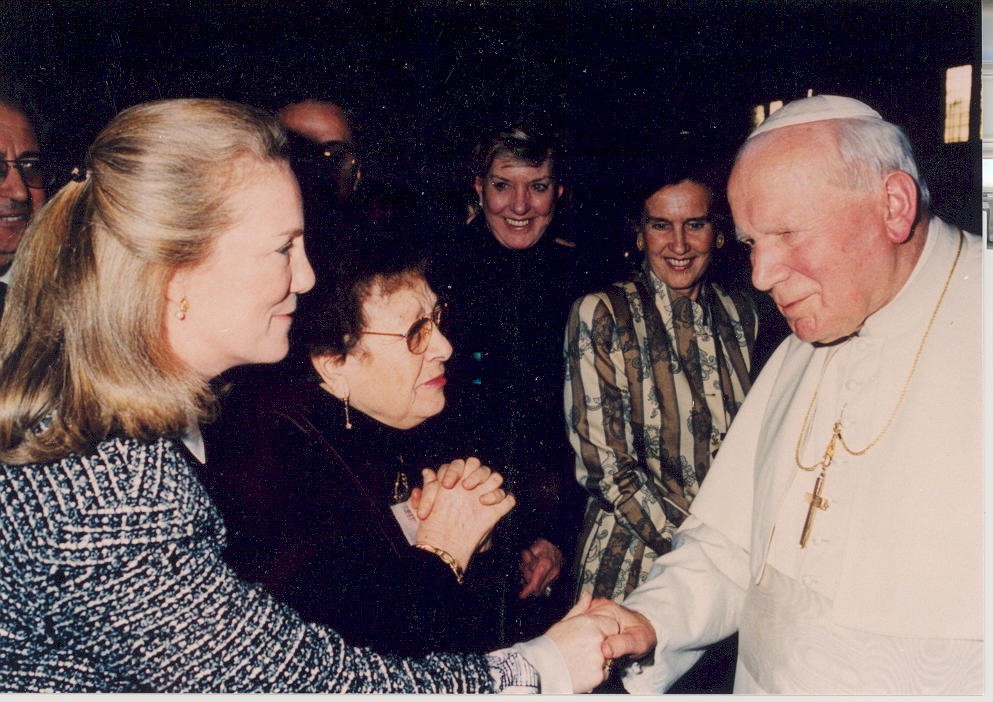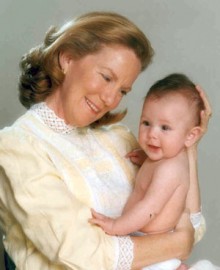
Communicating The Culture of Life: A Personal Call to Holiness
Pontifical Athenaeum of the Holy Cross, Rome, Italy
Offered by Mary Cunningham Agee,
President and Founder of the Nurturing Network
Vice Chairman of the Culture of Life Foundation
 In a very real sense, the challenge faced by the beloved Apostle John was similar to the one we are facing today. He was moved to put ink to parchment in an inspired effort to communicate in finite words the infinite Word made flesh, the Source and sustenance of all life.
In a very real sense, the challenge faced by the beloved Apostle John was similar to the one we are facing today. He was moved to put ink to parchment in an inspired effort to communicate in finite words the infinite Word made flesh, the Source and sustenance of all life.
He was successful not because he was a clever wordsmith but because he was aware of his real assignment: To bear witness to the Truth he had come to know personally and love intimately. He never lost sight of the fact that the Subject he was attempting to describe was the Son of God, the One who came that we “might have life and have it abundantly.”
I believe that nothing less is being asked of us. We have been “called by name” at a pivotal moment in history to the holiest of educational forums, the Pontifical Athenaeum of the Holy Cross, to explore the most effective ways and means to “communicate a culture of life.”
I do not believe for one moment that our purpose here is merely to learn the latest gimmicks in rhetoric and debate or simply to become better informed about the most recent advances in communication technology. While a thoughtful effort to cultivate the most responsible members of the media and a more sensitive application of language will undoubtedly improve the likelihood of our message being well received, lessons in such tactics would be better left to those who specialize in the craft of swaying public opinion. This is neither my area of expertise nor my intended focus during these few precious moments we have together.
What do we mean when we refer to a “culture of life” and what is really entailed when we speak of trying to “communicate” it?
The best answer can be found in the writings of the person who first introduced this now common phrase. Our Holy Father, Pope John Paul II, has expressed in numerous encyclicals both the singular importance and true meaning of the words, “culture of life.” The fact that he refers to a “culture of life” almost interchangeably with a “civilization of love” should point us in the direction of the Reality he seeks to convey. Since both “life” and “love” find their fullest meaning and most essential expression in the Person and teachings of Jesus Christ, this phrase prompts us to evaluate all of the institutions and influences that shape our culture against the ultimate standard of Our Lord’s example and ministry.
Given this objective, we might now consider what is really being asked of us when we speak of trying to “communicate” this Truth. The words that come closest to capturing the true meaning of this effort are found in the enlightened arena of evangelization or discipleship as opposed to the more mundane zone of verbal conveyance or self-expression. It is worthy of note that the Latin root of this overused verb “to communicate” literally means to “be joined, unified or connected,” to “make common or shared.” This is probably why we find it embedded in so many of the words in our most sacred vocabulary: Holy “Communion,” the “Communion” of Saints and Faith “Community,” to mention just a few.
It is little wonder that the master of lies (whose descriptive reference, “diabolical,” literally means “dividing”) has targeted for some of his most vicious attacks, the powerful industry that displays the word “communicate” in its very name. The Communication Industry with such awesome potential to help form a culture of life, instead, has too often distinguished itself as utterly destructive of this purpose. Where else have we observed character assassination perfected to an art form or the incessant reporting of the depraved and tragic rewarded with prizes and promotions or the flagrant abuse of the power to inform go unchecked by any higher authority?
It is for this reason that I say the importance of the true focus of our attention can hardly be exaggerated. We need only to consider the ever-widening circles of humanity being subjected to the cruelest and most degrading forms of abuse and injustice in order to appreciate the almost prophetic timing of this gathering. The responsibility falls upon us to pose the most provocative question that begs to be asked: “Why?” Why have we fallen so far short of forming a civilization worthy of the description “a culture of life?” Why would anyone tolerate the miserable, wretched conditions that constitute a culture of death over those that protect, defend and nurture life?
The temptation is to reply with a long list of villains including corrupt politicians, greedy lawyers, tawdry entertainers, politically-correct clergy, the prejudiced media, liberal educators and selfish parents. We’ve heard them all and perhaps added a few of our own. But such an analysis is flawed in at least two ways: First, it over-simplifies the scope and nature of the problem; and second, it places the responsibility for its solution in the hands of those over whom we have little or no control.
The over-simplification error would be tantamount to blaming the Crucifixion of Jesus Christ on Judas’ betrayal or Peter’s denial or even His Blessed Mother’s advice to perform His first public miracle at Cana. Any student of the early Christian era knows that a whole array of societal conditions at that time were ripe for ethnic, religious and political persecution. This historical fact is evidenced by such revealing cultural indicators as the flagrant irreverence of the moneychangers in the Temple, the unabashed brutality of the Roman soldiers, the excessive concern of Pilot about popular opinion and the obvious lack of due process for certain segments of the accused. The whole culture moaned for reform.
But it is to the second weakness that I would like turn our attention for it exposes something far more dangerous and insidious about human nature. We need only to turn to the Old Testament story in Genesis and hear once again Adam’s weak reply to his Creator, “It was the woman; she gave me the forbidden fruit.” (Genesis 3:12) How tempting it is when faced with our own sinfulness to point the finger of blame outward, to cast the first stone of judgment as far away from ourselves as possible!
And so I believe that we must pose our topical question in a very different way. It is time to turn the telescope around and fix our gaze on the space deep within, the place where our own deepest attitudes are formed. This is where, as the Greeks would say, a genuine “metanoya” or profound change can take place. I believe that it is also where renewal is most needed if we are to be empowered to communicate and help to build a culture of life.
Let’s begin by rephrasing the question, “Why do we have a culture of death?” so that the emphasis is now placed squarely on the shoulders of the one person over whom we have complete responsibility and control. We must probe for an answer with the laser beam of scrutiny directed toward the only soul for whom we will be held accountable when we meet Almighty God face to face. We must engage in nothing less than a sincere and thorough Examination of Conscience.
There is good reason that ever since the presence of evil was first detected, all of the Saints and most of the prophets have prescribed this form of purification as the critical starting point before any kind of personal witness or meaningful apostolate could be safely undertaken. For any battle that is cast in terms of “life vs. death” or “good vs. evil” must be recognized for what it truly is: a spiritual war. Identified as such, our true adversary is no less powerful or relentless than the “master of lies” himself. And since his game plan always involves manipulation, trickery and deceit, our strategy must be centered on those weapons that have been specifically designed to expose the lies and promote the truth. I am referring to prayer and fasting, the Sacrament of Penance and a daily examination of conscience. I am reminded of the warning issued to me most recently during a silent retreat, “If you should forget for even one day to examine your conscience, be absolutely certain that the mortal enemy of your soul has done it for you!”
An honest and humble examination of conscience is not only the right starting point in preparing ourselves to more effectively communicate or evangelize the Gospel of life, it is also the sacrificial gift that each of us can place on the altar of life immediately. We don’t have to raise any funds, establish an office, hire a staff or take any additional courses. We need only to retire as Christ did “to a quiet place” and then, on our knees, “beg” (as the word “prayer” means in virtually every language!) God to forgive us for all of the violence we have allowed to fester in our own hearts.
We might ask, “When did I neglect to “love my neighbor as myself” by turning a deaf ear to the cries of the oppressed, the lonely, the confused? When did I refuse to forgive, much less “love my enemy,” preferring to hold on to grudges and nurse old wounds? When did I selfishly “look out for number one” in the face of gossip or prejudice by choosing my words a little too carefully or by saying nothing at all? When did I take delight in examining someone else’s conscience for them – as opposed to spending time on my own?
This is the personal cleansing and interior healing process that I believe we must each perform before we can even begin to evangelize a sick and dying world culture. This is how the fertile ground must first be prepared if the Sower’s seed is to then take root and produce enough sweet and abundant fruit to nourish every diseased part of our decaying society. This is the simple but bold step we each must be willing to take if we are to be anointed and empowered by the Holy Spirit to “communicate a culture of life.”
I suggest that our standard for this self-examination should be the all-encompassing plea of the greatest priest and prophet of our time, Pope John Paul II: “Place all of your intelligence, talents, enthusiasm, compassion and fortitude at the service of life.” Even those of us who have been most actively involved on the front lines of the battle to defend and nurture life must wince at the thought of what more we could have done to fulfill this contemporary translation of “Love one another as I have loved you.” (John 13: 34) We each must ask if our gifts, regardless of quality or amount, have been offered “from our first fruits” (Proverbs 3: 9) or from our often embarrassingly abundant leftovers. We must force ourselves to ask whether we have engaged in either brief moments or woefully long interludes when, like the Prodigal’s Son, we have “squandered our Father’s gifts.”
On those occasions when I am feeling especially tired or particularly discouraged and am tempted to think that perhaps I have given “enough,” my thoughts need only return to the Gospel story of the earnest young man whom we are told “went away sad” after hearing Christ’s direct reply to his rather self-righteous question, “What more must I do?” Our Lord’s response was as explicit as it gets, “Go and sell everything that you own, give to the poor and then come follow me.” (Mark: 10:17-31) On a little lighter note, I am also reminded of my 103 year old Grandmother who used to say, “Good enough, Mary Elizabeth, is not good enough!” Perhaps not coincidentally, this wise and reverent lady was rewarded for her spiritual rigor by not only living to enjoy a relatively healthy old age but by being received into the Church as a convert on her 100th birthday.”
It is against this solid backdrop that I would like to now offer two very specific suggestions that I believe will serve us well as we refine and intensify our more enlightened efforts to communicate a culture of life. You could say that both of these nuggets of practical advice have been “earned the hard way.” They have been gleaned from years of often painful experience as opposed to any advanced degree in Psychology, Sociology or the Communication Arts:
First, Say less and do more; and
Second, Focus whatever you say and do on the service of one life at a time.
The reason that I have chosen to highlight these two seemingly simple suggestions above all others is because I have found that they not only work but capture the very essence of the teachings of Jesus Christ. Not surprisingly, therefore, they also reflect the deepest attitudes, or “noya,” of the Savior Who was sent to redeem us, the One Whose life we must imitate if we are to have eternal life. Courage and compassion, a practical passion for justice and a tender love for mercy, these are the dynamic blend and balance played out in the ministry and the Person of Jesus Christ.
And so, like Peter, we are being called upon to conquer fear. If we are to evangelize with courage, we will have to “get out of the boat in a stormy sea” (Matthew 15: 28-29) at Christ’s command. We will need to care so deeply about being “our brothers’ and sisters’ keeper” (Genesis 4: 9-10) that we will be ready to suffer whatever consequences and make whatever sacrifices that may be required to mend each broken life we meet -- one life at a time. I believe that a genuine faith deserves nothing less responsive and an authentic charity requires an expression no less personal.
There is yet another benefit that awaits those who mold and shape their witness to reflect Christ’s courageous faith and compassionate love. It involves the particular virtue that Our Holy Father has urged us to renew in this second year of preparation leading to the celebration of the Millenium. It is the antidote to the epidemic of despair that prevents so many gifts from ever being offered and torments so many lives in this cultural wasteland. I am referring to Hope, that joyful quality that is so often missing even among those who claim to believe and strive to love.
Hope seems to be especially hard to come by because it so often behaves like an elusive butterfly: the more deliberately we set out to capture it, the further it seems to move beyond our grasp. And yet, when we focus our attention elsewhere, it returns and rests gently on our shoulder. This may be why Mother Teresa would encourage her beloved Missionaries of Charity to concentrate first on practicing the virtues of loving trust in Jesus Christ and faithful submission to God’s will if they would seek to be rewarded with the gift of joyful hope.
Let’s return to my first suggestion about how we can more effectively communicating a culture of life: “Say less and do more.” The old axiom “Actions speak louder than words” has become all the more true in this world where literally billions of dollars are being spent every year by industries whose sole purpose is to “manage the news,” twist the truth and reshape reality for their own pragmatic purposes. Studies have shown that the vast majority of people have, understandably, become exceedingly cynical. They feel deceived by just about everyone from the morning talk show host to the evening news anchorperson. Trust has ebbed to a new low when people are no longer convinced that physicians will not inject them with a lethal dose of poison if they become infirm or terminally ill, that judges will not send them to prison if they defend the rights of the unborn, and that political leaders will not endorse laws that endanger the lives of ever-expanding segments of the population.
We have rightfully become a wary people. We are increasingly “watchful and vigilant” of those who “come to us in sheep’s clothing” saying, “Do as I say, not as I do.” We have not forgotten that the hypocrites and Pharisees were also known for being long on talk and short on action. We have learned the hard way to heed the implicit warning in Our Lord’s advice when he says, “You shall know the tree by its fruits.” (Mt 12: 33) He did not say “by how it is described” or, as we might be more apt to suggest today, “by how it is marketed and advertised.”
The truth of our message that “all life is infinitely precious” is far more likely to be well received when our words are supported by consistent, Christ-like action. This is the only fail-safe cure that I have found for the canker of suspicion that has made it so difficult to communicate a culture of life. Words have, indeed, become cheap and unreliable in today’s explosive information age. We are starved for action, the kind of practical compassion that Our Lord insisted upon from all of His followers. “Feed my lambs,” He instructed Peter. (John 21: 15) “Do unto others as you would have them do unto you,” He taught the faithful. (Mt 7: 12) “Feed the hungry, give drink to the thirsty, welcome the stranger, clothe the naked, care for the ill and visit those imprisoned,” He consistently urged His disciples. (Matthew 25: 35-40)
Jesus was the supreme practical idealist. Because He had a perfect knowledge of our fragile human nature, He used every opportunity to reach us through the full range of our senses as well as our intellect. He must have known that it would require only one action-packed miracle for every “seventy-times-seven” sermons in order to convert the hard-hearted, doubting multitudes. For ours is not the religion of a clever prophet who kept a safe distance from the messy, unpredictable action of daily life, but One who engaged in relationships as real and complex as any we experience today. He did not choose to leave us with a well-crafted treatise on theology or words etched on ten cold stone tablets with which to piece together our Christian witness. Rather, He gave us His life, a living human testimony in action to the true challenge of communicating the Gospel of life in the anguish and the glory of every day existence.
It was this awareness that caused my professional life to take a sharp detour about fifteen years ago from the comfort and grandeur of an executive suite to the more modest office of a founder and managing director of an international charity. While it took the personal anguish of a mid-trimester miscarriage for me to fully grasp the horror of prenatal death, it has taken the daily, life-saving activity of the Nurturing Network to teach me the value of translating my reverence for all human life into concrete action.
Since our time is limited, I cannot recount for you all that this apostolate has come to mean to me, but when I call to mind and heart the 11,000 innocent children whose physical lives have been saved and the equal number of mothers whose spiritual lives have been nourished, I cannot imagine a more enduring or more meaningful way to “communicate a culture of life.” The staff of the Nurturing Network has heard me say more often than they may wish to recall, “It is not enough to say that we are ‘for life’ unless we are willing to provide the practical means to support it.” This is not just a catchy slogan but a heartfelt conviction that is lived out every day in the courageous, sacrificial actions of our 25,000 volunteer members worldwide.
Isn’t this why Mother Teresa’s words still linger in our hearts long after we have read her books or listened to her tapes? Hers was a ministry of love lived out in Christ-like, compassionate action. As she would say with such clarity and conviction, “Our vocation is to do the little things with great love.” And hasn’t this been the trademark of all the great Saints to whom we turn for guidance and inspiration? Consider, for example, the “just” man who must have known Our Lord better than all of the others. To him not a single word in Sacred Scripture has ever been attributed. And yet, Saint Joseph’s courageous “fiat” surely lives on, teaching us through his obedient example of faith, hope and love in action.
Let’s examine my second suggestion that is intended to strengthen our ability to communicate a culture of life: Work to defend and nurture life serving “one life at a time.” Whenever we become too theoretical, too “macro” or too global in our approach to solving any human issue, we almost inevitably tend to become more political and less personal. In all of the “pro-life” vs. “pro-choice” discussions that I have witnessed over the years, I have seen little evidence of any change of opinion or conversion of hearts due to even the most brilliant, broad-based, intellectual appeals. No matter how articulate, morally correct or obviously sincere many such pronouncements have been, they have failed to penetrate the hearts and minds of those most in need of the truth.
I believe that this communication tragedy may have more to do with how the message has been delivered than which words have been used to convey it. We need only to turn again to the example of the greatest Communicator, Teacher and Healer of all time to see where we may have gone wrong. Not only did Our Lord express His love through concrete, tangible actions but He showed a clear preference for delivering His message to one uniquely blessed soul at a time. When He cured the leper, forgave the sinner, consoled the widow, raised the dead to life, made the lame to walk and the blind to see, He refused to keep a safe distance from His subject. His miraculous gifts were not designed to be handed out to the masses through an impersonal speech or grandiose gesture. Instead, with few exceptions, He chose to reach out and touch one broken, hurting person at a time, healing their wounds individually -- one life at a time.
Wasn’t this the point of the parable of the Good Shepherd who risked leaving His flock of ninety-nine in order to find the one lamb who was lost? Might this also be the reason He singled out the woman caught in the clamoring crowd who somehow managed to touch his cloak? Despite all of the pushing and shoving, He stopped to ask with singular focus and intensity, “Who touched me?” Imagine how the crowd must have gone silent and the rest of the world must have vanished for those few precious, life-altering moments in which Our Lord acknowledged this woman’s extraordinary faith. There could have been no doubt in her mind or anyone else’s looking on that hers was a life of infinite value. He demonstrated one more time through His actions, the incomparable healing power of communicating with tender love the Gospel message of life – one life at a time.
In closing, I need only to reflect upon the thousands of contemporary Mary Magdalene’s whom I have had the joy of serving since founding the Nurturing Network to say with conviction that the binding of deep wounds and the healing of broken hearts is an intensely intimate and essentially practical experience. The simple but profound truth is that there is no efficient or effective substitute for the private, personal, time-intensive conversations that translate beyond words into the most life-saving message of all: “You are a beloved child of God. No matter what mistake you may have made or sin you may have committed, you are infinitely valuable and precious in God’s sight.” These are the healing words that communicate the Gospel of life. They ring true and find their way home in every human heart. And when enough voices proclaim this truth with genuine compassion and unwavering courage, Christ’s love will become the leaven in the bread of new life that will, indeed, “renew the face of the earth.”
~ Mary Cunningham Agee

You are a beloved child of God. No matter what mistake you may have made or sin you may have committed, you are infinitely valuable and precious in God’s sight. These are the healing words that communicate the Gospel of life.
“Only in heaven will we know how tremendously effective The Nurturing Network has been in bringing the message of life to men and women throughout the world. I am so grateful to you for your own courage and perseverance and for the wonderful way in which you have made this beautiful cause so much a part of your life.”
~ Theodore Cardinal McCarrick
(TNN Spiritual Advisor)

“The Nurturing Network has been referred to as a ‘beacon of hope; and a 'demilitarized zone in America’s cultural civil war”' ranging from the CBS 48 Hours to Newsweek and the Wall Street Journal.”
~ Journalist
(TNN Media)

We might ask, when did I neglect to love my neighbor as myself by turning a deaf ear to the cries of the oppressed, the lonely, the confused? When did I refuse to forgive, much less love my enemy, -- preferring to hold on to grudges and nurse old wounds? When did I selfishly look out for number one in the face of gossip or prejudice by choosing my words a little too carefully or by saying nothing at all? When did I take delight in examining someone else’s conscience for them –as opposed to spending time on my own?
“One year when the American College of Obstetrics and Gynecology convened here locally, Mary accepted my invitation to offer a keynote address. I was not surprised when her remarks were enthusiastically received. I was honored to be able to provide TNN with a source for obstetricians from around the country who would be able to help TNN Clients.”
~ Obstetrician
(TNN Professional Member and Donor)

In all of the “pro-life” vs. “pro-choice” discussions that I have witnessed over the years, I have seen little evidence of any change of opinion or conversion of hearts due to even the most brilliant, broad-based, intellectual appeals. No matter how articulate, morally correct or obviously sincere many such pronouncements have been, they have failed to penetrate the hearts and minds of those most in need of the truth.

“Nurturing Network is the most amazingly sensible and helpful method of helping women with crisis pregnancies. It makes such sense to have a network of homes and doctors and colleges and businesses to help these women. It is a big idea and it took someone of Mary’s training and commitment to build this national network.”
~ Senior Marketing Executive

It was this awareness that caused my professional life to take a sharp detour about fifteen years ago from the comfort and grandeur of an executive suite to the more modest office of a founder and managing director of an international charity. While it took the personal anguish of a mid-trimester miscarriage for me to fully grasp the horror of prenatal death, it has taken the daily, life-saving activity of the Nurturing Network to teach me the value of translating my reverence for all human life into concrete action.

“It is with great joy that I congratulate you on your work founding and directing the Nurturing Network. The Nurturing Network is truly a blessing! The love, support and generosity which the Network gives to those who are in need are a testimony to your faithfulness.”
~ Pastor
(TNN Spiritual Advisor)
"We must force ourselves to ask whether we have engaged in either brief moments or woefully long interludes when, like the Prodigal’s Son, we have “squandered our Father’s gifts."
~ Mary Cunningham Agee
It is time to turn the telescope around and fix our gaze on the space deep within, the place where our own deepest attitudes are formed.
Whenever we become too theoretical, too “macro” or too global in our approach to solving any human issue, we almost inevitably tend to become more political and less personal. In all of the “pro-life” vs. “pro-choice” discussions that I have witnessed over the years, I have seen little evidence of any change of opinion or conversion of hearts due to even the most brilliant, broad-based, intellectual appeals. No matter how articulate, morally correct or obviously sincere many such pronouncements have been, they have failed to penetrate the hearts and minds of those most in need of the truth.

I believe that this communication tragedy may have more to do with how the message has been delivered than which words have been used to convey it. We need only to turn again to the example of the greatest Communicator, Teacher and Healer of all time to see where we may have gone wrong. Not only did Our Lord express His love through concrete, tangible actions but He showed a clear preference for delivering His message to one uniquely blessed soul at a time. When He cured the leper, forgave the sinner, consoled the widow, raised the dead to life, made the lame to walk and the blind to see, He refused to keep a safe distance from His subject. His miraculous gifts were not designed to be handed out to the masses through an impersonal speech or grandiose gesture. Instead, with few exceptions, He chose to reach out and touch one broken, hurting person at a time, healing their wounds individually -- one life at a time.
"This is a personal cleansing and interior healing process that I believe we must each perform before we can even begin to nurture a sick and dying world culture."
~ Mary Cunningham Agee

